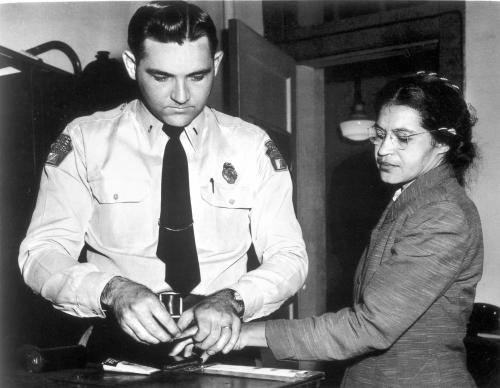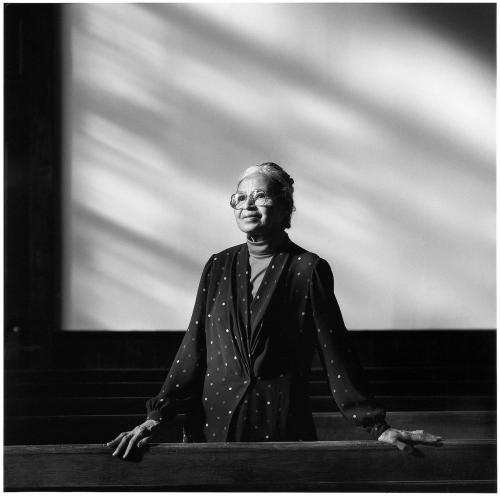

11:00 am EDT - 1:00 pm EDT
Past Event
On March 26, 2021, Foreign Policy at Brookings hosted Sviatlana Tsikhanouskaya, the leader of the Belarusian democracy movement, for the seventh annual Justice Stephen Breyer Lecture on International Law to discuss the current state of democracy in Belarus and what the United States and Europe can do to support pro-democracy movements around the world. A panel discussion, moderated by Senior Fellow and Fritz Stern Chair Constanze Stelzenmüller, followed Tsikhanouskaya’s address.
Ambassador of the Netherlands André Haspels and Deputy Mayor of The Hague Saskia Bruines provided opening remarks, alongside video remarks from Justice Stephen Breyer, who stressed the importance of the rule of law. Drawing upon Albert Camus’s “The Plague,” he argued that external threats to democracy are ever-present, and only by working consistently to uphold democratic principles will it survive.
Tsikhanouskaya then gave a keynote address, explaining that the crackdown by Belarusian President Alexander Lukashenko against the political opposition is “a crisis of unprecedented proportions worsening by the day.” The rule of law has “collapsed,” Tsikhanouskaya said; this is “repression Belarusians haven’t known since the Stalinist times.”
Looking to the future, Tsikhanouskaya remarked that international cooperation with a new democratic Belarus will be “based on universal values of democracy, rule of law, respect for human dignity, and equality.” However, she pointed out that anti-democratic tendencies are currently “deeply entrenched in the fabric of [the] political system and this system has mastered the art of manipulating public opinion and election rigging.”
To sustain the protest movement and facilitate a peaceful transition of power, Tsikhanouskaya concluded that the international community should remain consistent, “true to its own principles, priorities, and policies,” and focused on “flexible, prompt, [and] action-oriented” solutions. She further advocated for placing targeted sanctions with strict conditionalities on the Lukashenko regime and on “Lukashenko’s wallets” — oligarchs in his inner circle — to increase the pressure needed to bring him to the negotiating table. Finally, Tsikhanouskaya urged the international community not to sign agreements with the Lukashenko regime, and to consider revising or voiding prior agreements.
Following her remarks, Stelzenmüller asked Tsikhanouskaya how the Belarusian Liberation Plan will bring Lukashenko to the negotiating table. Tsikhanouskaya explained that although Lukashenko “cares only about himself,” individuals within the government are eager to see the formation of a democratic Belarus. She emphasized that international organizations could pressure Lukashenko to stop what she called a “political and humanitarian crisis” and hold new elections. Considering what advice she would give the citizens of Western democracies, Tsikhanouskaya urged not to “forget about how valuable [democracy] is.” Do not “spoil the meaning of democracy,” she said. Instead, to “try to improve what you have.”
After their conversation, Bob Deen, senior research fellow and coordinator of the Russia and Eastern Europe Center at the Clingendael Institute, opened the panel discussion by pointing out that the current pro-democracy movement in Belarus is stronger and more resilient compared to the 2006 Jeans Revolution and 2017 street protests, and has shown that Lukashenko no longer remains a legitimate leader. Deen argued that the biggest hurdle facing the Belarusian democracy movement now is that Russian support for the Lukashenko regime outweighs international support for the pro-democracy movement.
Kara McDonald, deputy assistant secretary at the State Department’s Bureau of Democracy, Human Rights, and Labor, rejected the idea that “values and interests are at odds or a zero-sum game” and noted that in addition to working closely with the pro-democracy movement, the United States has pushed the Belarusian government to respect human rights and to release all political prisoners.
Gerard Steeghs, director of Multilateral Organizations and Human Rights in the Dutch Ministry of Foreign Affairs, underscored that democracy promotion cannot be done solely through punitive actions or lecturing. Rather, democratic governments must have positive messaging, “making very clear why democracy as a system of government, however imperfect, is able to unlock the potential of society – in the political sense, in the cultural sense, [and] in the economic sense.”
While Stelzenmüller noted that intergovernmental organizations such as NATO have no legal mechanisms to hold illiberal members accountable for anti-democratic behavior, Thomas Wright, director of the Center on the United States and Europe at Brookings, stressed that “it is very simple to change” the NATO alliance. It could even “be done unilaterally by the United States,” he said, because NATO is just “an interpretation of Article 5 of the founding treaty.”
Concluding the panel, Stelzenmüller said that democracy promotion today is not about creating a “hegemony of Western-style democracies,” but a “practical solidarity with nations and civil society who seek freedom, self-determination, and democracy on their own terms.”


Discussant

Moderator

Panelist




Elaine Kamarck
March 3, 2026

Keon L. Gilbert, Nicol Turner Lee
December 10, 2025

Jasmine C. Jackson
December 9, 2025